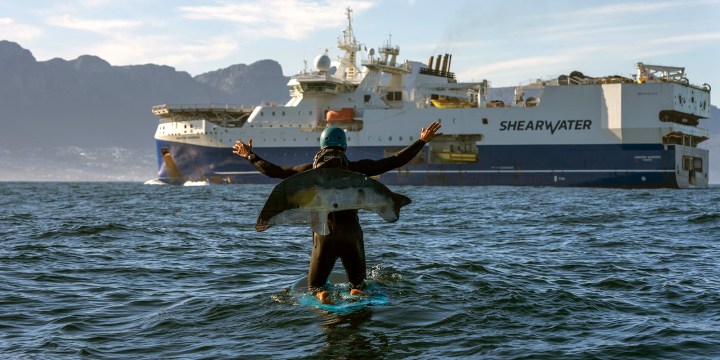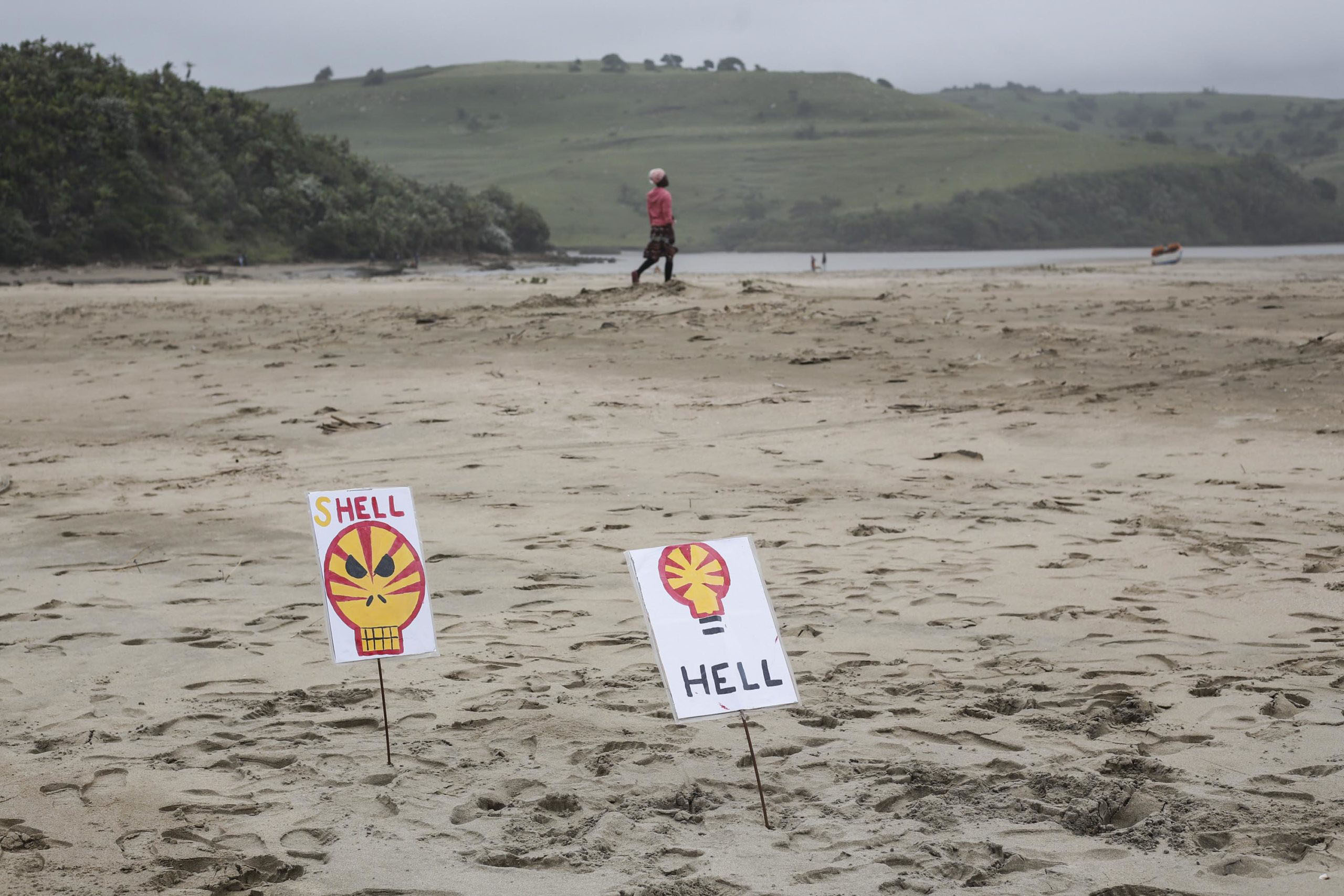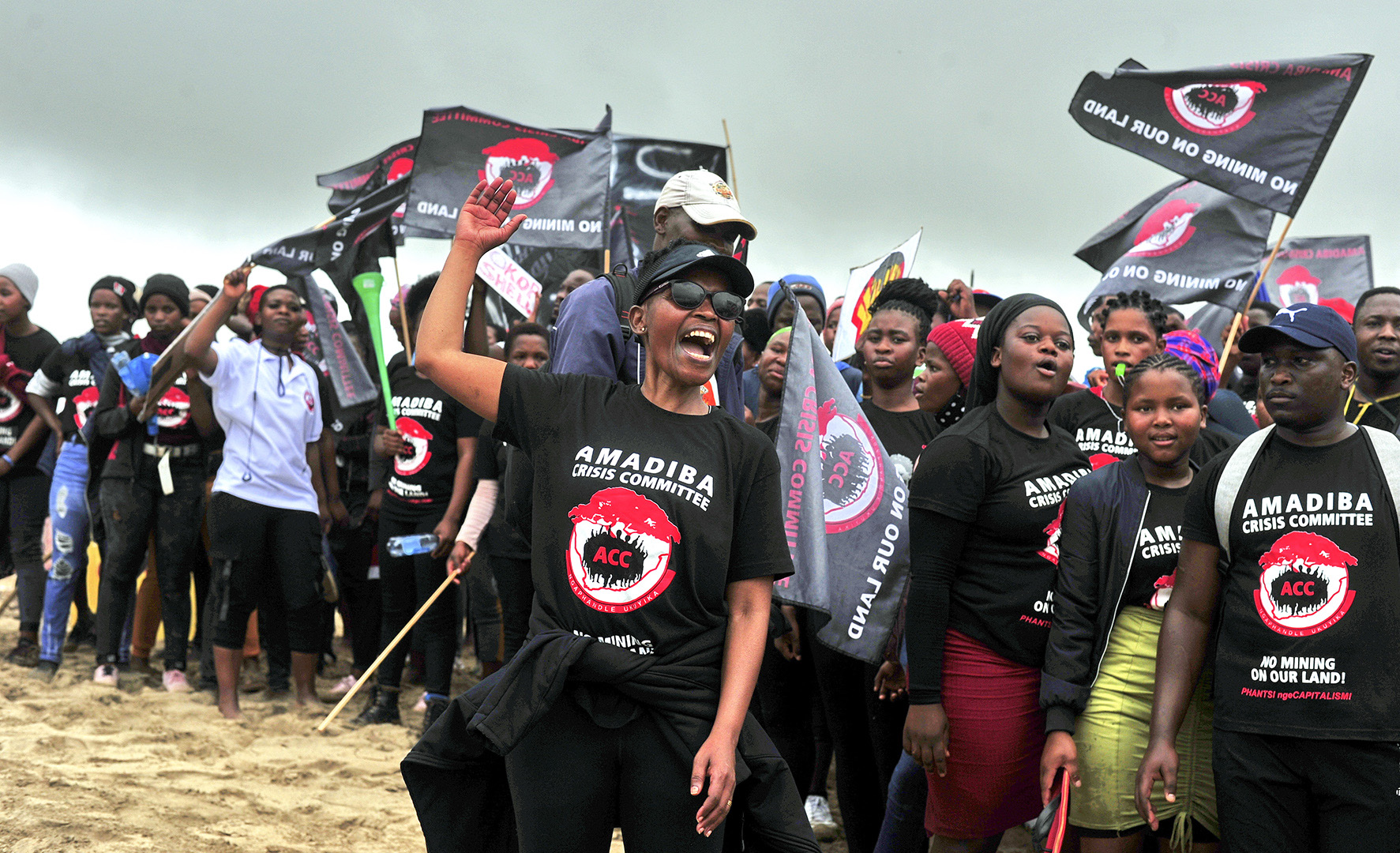FOREVER OIL
Shell determined to pursue seismic exploration ambitions off South Africa’s Wild Coast

Oil giant is appealing cancellation of permit to explore for oil in the ecologically rich waters.
On the southern coast of Africa, local community groups and environmental activists have been celebrating a significant legal victory over a major oil player. In September a South African court prohibited Shell’s controversial plan to conduct seismic exploration for oil and gas deposits off the Wild Coast in South Africa’s Eastern Cape Province. But, the battle is far from over, Shell is appealing the ruling, and it has the resources and government support to take the case through the country’s court system to get the decision it’s after.
For the moment though, the advantage lies with the anti-drilling activists.

Protest against Shell who plan seismic surveys along the coast at Mzamba Beach on the Wild Coast, on 5 December 2021. (Photo: Rogan Ward)
“We stand for human environmental rights and this [Shell’s planned exploration] was illegal as we, the local communities, were not consulted,” said Sinegugu Zukulu, who is a programme manager at the environmental nonprofit Sustaining Wild Coast (SWC), one of the many local groups that filed two lawsuits contesting the permit.
The suits argued that Shell hadn’t adequately consulted with impacted communities, nor had it conducted a required environmental impact assessment of underwater seismic testing in the region.
The Wild Coast is a famous migratory path for whales moving north from Antarctica during winter in search of warmer waters and then returning to the Antarctic Ocean at the start of summer. Scientists are concerned the noise from the surveys will disrupt these patterns, while causing stress and interfering with animals communicating with each other affecting their ability to find food, reproduce, and even calves’ ability to suckle at their mothers. Dolphins and sharks are just two other marine species that could be negatively affected by seismic surveys through behavioural changes to get away from the noise. Although no baseline research exists on the effects of these surveys, the suits against Shell’s exploration included statements from six marine biologists affirming the latest consensus on the damage such surveys can do.
“Coastal communities and the environment are both being violated. It’s nothing new, Europeans going and exploiting the ‘Third World’… it’s about enriching shareholders of Shell, not African economies,” Zukulu said.
In its ruling, the Makhanda high court cancelled the permit on grounds of improper community consultation by Shell, saying “consultations consist not in the ticking of a checklist, but engaging… in a two-way process aimed at achieving consensus”. It added that “a chief does not denote a community” and cultural practices and communities’ ancestral beliefs towards the ocean and environment hadn’t been taken into account by the government treating Shell’s application as an “energy-sector specific issue”.
In addition, the court stated that as experts differed on whether the damaging effects of the seismic survey on oceanic wildlife had been mitigated and emphasised that Shell, and the South African government, take a precautionary approach.
Litigation battles
But the struggle to protect the Wild Coat is far from over. Shell and South Africa’s Minister of Mineral Resources and Energy are appealing the judgement. This past Tuesday (December 13), the same court that cancelled Shell’s seismic exploration permit earlier, granted the company leave to appeal that judgement at South Africa’s Supreme Court of Appeal. However, the court did emphasise that it believed the appeal would be unsuccessful.
“The appeal sought has no reasonable prospects of success,” the court said. Though it added that it agreed with Shell that “the matter is of significant importance and requires ventilation by the Supreme Court of Appeal”.
“It’s a real David versus Goliath here,” said Ricky Stone, one of the lawyers representing some of the applicants against Shell. The oil giant has a long history of court cases across the continent.
Just last year, Shell was finally found to be responsible for decades of oil spills in the Niger Delta that destroyed local farmland and fisheries. The case was originally filed in 2008 and two of the plaintiffs died in the 13 years it took for the verdict to be issued. And earlier this month, Shell was granted the right to appeal this decision. In 2009 the company paid out $15.5-million in compensation for the killing of nine Nigerian activists who fought against widespread oil pollution in the Niger Delta during the turbulent 1990s.
Here, in South Africa, activists are battling not just oil companies but their own government, which supports the project because it believes fossil fuel exploration will boost the country’s energy security and would bring new jobs that would aid economic development of this remote region. Currently, the coastal economy is dominated by fishing and tourism, with many people also working in agriculture, all of which would be threatened by oil and gas development in the region.
Visit Daily Maverick’s home page for more news, analysis and investigations
In 2014, Impact Africa, a subsidiary of African exploration company Impact Oil & Gas Limited, was granted a license by South Africa’s Department of Mineral Resources and Energy, to carry out seismic exploration for oil and gas off in an ecologically sensitive region of the Wild Coast that is also home to several Indigenous communities.
At the time, Stone’s law firm, Cullinan & Associates, represented local fishing and ski boat organisations as part of public consultations over whether a license should be granted. For eight years, the groups heard little about the status of exploration. Then, in 2021, the license was acquired by Shell in partnership with Impact Africa. In October 2021, Shell announced that it would begin conducting a seismic survey in December that year. Soon after, a ship hired by the company to conduct the tests showed up in the area, leading to widespread public protests across the country.
The speed with which Shell planned to move forward with exploration left environmental and community groups scrambling to file interdicts with the courts. They sought an interim prohibitory interdict, in November 2021, based on the potential damage from the exploration to marine life, especially whales who migrate along that coastline, but that case was dismissed. Community groups, including fishers and tourism and surfing outfits, then filed a second, interdict focused on the communities that will be affected by the seismic exploration and any development of oil drilling. They also argued that the seismic survey would do lasting damage to coastal habitats of whales and other marine life.
“Nobody’s done a survey about damage of livelihood if they find oil, they tell us how much is invested. That’ll be the end of sources of livelihood if they find oil. If the amount of [fish] catch drops, no one can take care of that drop” Zukulu says.
In its September ruling on that case, the court found Shell had failed to consult with communities in the area.
In its defence, the oil giant claimed communities had been consulted in 2014, at the time Impact Africa was granted the license. It produced affidavits from several local kings and chiefs from the area as proof. However, the project’s opponents successfully argued that this did not amount to consultation.
Collusion vs consultation
In South Africa, there’s a long history of state or its business partners claiming legitimacy and community approval for projects based on colluding with one or two chiefs in the communities concerned and placing notices in newspapers. Critics say this practice harkens back to the days of apartheid.
“We’re really disappointed that our own [energy] minister is using the old method of using the traditional leadership as the key of stealing our minerals in Africa, this is how it used to be in apartheid,” said Nonhle Mbuthuma of Amadiba Crisis Committee (ACC) another local organisation opposing Shell’s seismic exploration.

Amadiba Crisis Committee leader Nonhle Mbuthuma addresses a protest meeting on a beach along the Eastern Cape Wild Coast against plans by multinational Shell to explore offshore for gas and oil. (Photo: Lucas Ledwaba / Mukurukuru Media)
The South African constitution demands community consultation before projects, such as this one, can be undertaken. Proper community consultation involves seeking the input of the wider communities affected. This can be done through chiefs, but they have no authority to assert that they alone represent the community and can agree to development projects without engagement and approval from the communities they serve.
Not only had these chiefs not engaged with the communities before siding with Shell, Sinegugu argues they weren’t even representative of all the areas that are going to be affected. “They said they spoke to kings, they consulted people who claimed to represent these kingdoms,” said Sinegugu. “Our kings don’t make decisions on our behalf.”
Makhanda high court concurred with this opinion, saying in its judgement that consulting only with kings and other traditional leaders “finds no space in a constitutional democracy.”
Now that Shell is preparing to take the case to the Supreme Court of Appeal, the activists need to be prepared to fight the company not only there, but also at South Africa’s Constitutional Court, the highest court in the country, as Shell appears prepared to take this as far as they can in a bid to wear down the finances and resolve of the activists they’re up against.
“Finances will remain a serious challenge, a lot of our advocates and attorneys are working at a reduced rate,” Stone of Cullinan & Associates said. The community groups have been raising funds to pay the legal fees. The South African public has been particularly supportive of this action, but there’s a limit to how much financial support they can offer.
Beyond the immediate consequences for South Africa’s Wild Coast and the communities that rely on it, the global impact of this project, if it does go ahead, is more fossil fuels being burned and more carbon emissions. Shell is seeking to drill more, despite being bound by a Dutch court to reduce its emissions by 45% (from 2019 levels) by 2030.
Roos Wijker of activist shareholder group, Follow This, said: “Oil majors should stop looking into new exploration areas. The problems in South Africa and elsewhere are blessings in disguise for Shell because every dollar in exploration is wasted.” DM/OBP
First published by Earth Island Journal.



















 Become an Insider
Become an Insider
Europeans going and exploiting the ‘Third World’…
It’s not Europeans it’s Shell and with the blessings of Gwede Mantashe. SA would not be a Third World country, if the ANC & Co. had not stolen all the money of the state i.e. taxpayers’ hard-earned money.
It always amazes me that activists get to make sweeping statements about what does and does not constitute a risk to the environment without citing any proof. As much as I care about the environment, the attitude that organisations such as Greenpeace have towards something vital like nuclear power, has made me realise that many of these activists are radicals and do not actually base their positions on science only on their personal prejudice. This means, generally speaking, their positions on many issues, can not be trusted.
I’m all for renewables and the just energy transition but not enough of a hypocrite to drive a fossil fuel powered vehicle yet oppose the exploration of local resources required for it. It would be nice to pay less than R15 for a litre of diesel again.
On balance oil can be drilled safely with no harm to the coastal areas it operates in, we have Mossel Bay as a relevant local example of this.
What really interests me is the opposition to seismic testing. it appears to be a globally accepted practice backed by science. Clearly there was a PRIME opportunity for the opponents to it that claim negative consequences to prove their concerns? This ship operated off the wild coast for 2+ months, yet we don’t seem to see any evidence of negative consequences reported by these lobby groups. Their silence is telling for me in this regard.